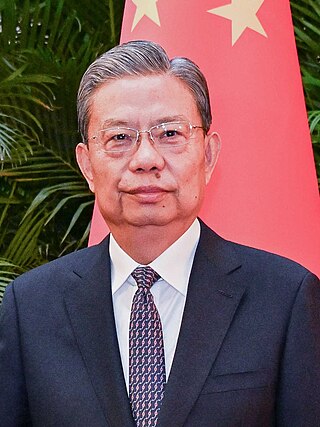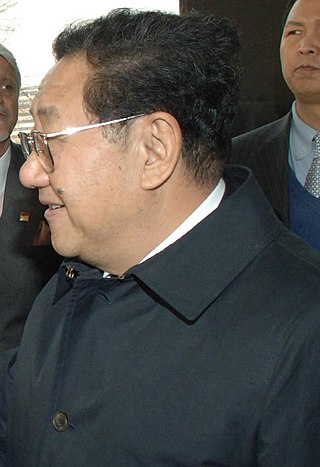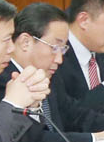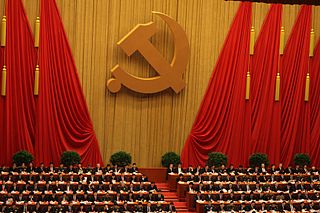Related Research Articles

Zhao Leji is a Chinese politician who is the current chairman of the Standing Committee of the National People's Congress and the third-ranking member of the Politburo Standing Committee of the Chinese Communist Party.

The Northeast Counter-Japanese United Army, also known as the NAJUA or Northeast Anti-Japanese United Army, was the main Counter-Japanese guerrilla army in Northeast China (Manchuria) after the Japanese invasion of Manchuria in 1931. Its predecessors were various Counter-Japanese volunteer armies organized by locals and the Manchuria branches of the Chinese Communist Party (CCP). In February 1936, the CCP, in accordance with the instructions of the Communist International, issued The Declaration of the Unified Organization of Northeast Counter-Japanese United Army and marked the official formation of the organization.

Sun Zhengcai is a former Chinese politician and senior regional official. From 2012 to 2017, Sun served as the Communist Party Secretary of Chongqing, an interior municipality, and a member of the Politburo of the Chinese Communist Party. Prior to that, he served as the Party Secretary of Jilin province, and Minister of Agriculture of China.

Wei Jianxing was a senior leader in the Chinese Communist Party (CCP), most active during the 1980s and 1990s. He successively held a number of important offices, including member of the Politburo Standing Committee, the Secretary of the Central Commission for Discipline Inspection, the Communist Party Secretary of Beijing and the chairman of All-China Federation of Trade Unions.

Chen Kuiyuan is a former Chinese politician. In a lengthy public career, Chen served variously as the vice chairman of Chinese People's Political Consultative Conference (CPPCC), the president and the Chinese Communist Party Committee Secretary of the Chinese Academy of Social Sciences, and CCP Committee Secretary of the Tibet Autonomous Region and Henan. He retired in 2013.
Events in the year 2010 in China.
The History of Shanghai expo began when numerous scholars and government officials envisioned China would one day join the world community in hosting an international global expos. Different governments have gained international experience in participating in fairs outside China. It wasn't until the later 20th century when the participation and hosting became more regular.

The 2010 Shanghai Expo opening ceremony occurred on April 30, 2010 at the Shanghai World Expo Cultural Center in Shanghai, People's Republic of China, a day before the opening of the Expo 2010.The opening ceremony was planned and designed by ECA2's founder, Yves Pepin.

Wei Fenghe is a retired general in the People's Liberation Army (PLA) who served as commander of the PLA Rocket Force, formerly known as the Second Artillery Corps. From 2018 to 2023, he was the Minister of National Defense, the first to have not come from the PLA Ground Forces and the first-ranked State Councilor from March 2018 to March 2023, and also the first-ranked ordinary Member of the Central Military Commission (CMC).

Fu Zhenghua is a former Chinese politician and public security officer. He was convicted of taking bribes and bending the law for personal gain in September 2022, and was sentenced to life imprisonment.

"Communist bandit" is an anti-communist epithet directed at members of the Chinese Communist Party. The term originated from the Nationalist Government in 1927. Nowadays outside mainland China, some Chinese people use the term "中共" to refer to Communist China or the Chinese Communist Party. It could also be translated to the English term "commie".
"Charley" Song Lin is a former Chinese business executive. At the pinnacle of his career, he served as the Board Chairman and Chinese Communist Party Committee Secretary of China Resources, a state-owned conglomerate with interests in the beverages, consumer goods, and food industries. He was also the Chairman of China Resources Shenzhen International Trust, and Harvest Capital Partners, an asset management and investment subsidiary of China Resources.
Zhu Mingguo is a former Chinese politician of Li ethnic heritage who spent his career in Guangdong, Hainan, and Chongqing. Zhu was an alternate member of 18th Central Committee of the Chinese Communist Party. He was investigated by the Chinese Communist Party's anti-corruption agency in November 2014. Previously he served as the chairman of the Guangdong Provincial Committee of the Chinese People’s Political Consultative Conference. He has become the second senior Party and government official to be investigated in Guangdong in six months, following Wan Qingliang, former Party chief of Guangzhou.

A far-reaching anti-corruption campaign began in China following the conclusion of the 18th National Congress of the Chinese Communist Party (CCP) in 2012. The campaign, carried out under the aegis of Xi Jinping, General Secretary of the Chinese Communist Party, was the largest organized anti-corruption effort in the history of CCP rule in China.

The 3rd National Congress of the Chinese Communist Party was held in Guangzhou at 31 Xuguyuan Road between June 12 and June 20, 1923. It succeeded the 2nd National Congress of the Chinese Communist Party and preceded the 4th National Congress of the Chinese Communist Party. The congress was attended by 40 representatives across China and Moscow representing 420 party members of the Chinese Communist Party (CCP).
Gong Wusheng is a former Chinese politician who served as party secretary of Loudi from 2011 to 2016, and mayor of Yongzhou from 2005 to 2011. As of May 2020, he was under investigation by China's top anti-corruption agency. Gong crossed paths with and was known to be a close ally of Qin Guangrong. He was a delegate to the 11th National People's Congress.
The Great Translation Movement is an online movement and Twitter account launched during the 2022 Russian invasion of Ukraine. It seeks to document displays of ultranationalist, pro-Russian and anti-Western sentiment in China by translating comments found in the Chinese internet. The languages it has translated to include English, Japanese, Korean, and Spanish. The Guardian has pointed out that the Great Translation Movement has been a source for English-language speakers to understand the Chinese Communist Party (CCP) and state media's reaction towards the Russian invasion of Ukraine, though experts cautioned seeing the posts as representative of the Chinese public, noting that China has a highly censored media environment.

Anti-bourgeois liberalization as a political slogan of the Chinese Communist Party (CCP), it was proposed by Deng Xiaoping and others in the early 1980s. As a political movement against "bourgeois liberalization", it started at the CCP Congress held in Beijing in September 1986. The Sixth Plenary Session of the Twelfth Central Committee of the CCP was officially launched in early 1987.
Dai Daojin is a former Chinese politician who spent his entire career in his home-province Hunan. He joined the Chinese Communist Party (CCP) in December 1975, and began his political career in December 1977. He was investigated by China's top anti-graft agency in January 2024. Previously he served as vice chairman of the Hunan Provincial Committee of the Chinese People's Political Consultative Conference and before that, vice governor of Hunan.
References
- ↑ Kansascity.com. "Kansascity.com." Chinese Communist Party issues new ethics code. Retrieved on 2010-03-02.
- ↑ Big5.enorth.com.cn. "Big5.enorth.com.cn." 中共印發廉政准則 52個『不准』規范乾部行為. Retrieved on 2010-03-02.
- ↑ Chinareviewnews.com. "Chinareviewnews.com." 中共發佈廉政準則 八大“禁止”嚴肅黨紀. Retrieved on 2010-03-02.
- ↑ eTaiwannews.com. "eTaiwannews.com." Chinese Communist Party issues new ethics code. Retrieved on 2010-03-02.
- ↑ Timesonline.co.uk. "Timesonline.co.uk." Lavish living falls foul of party code to stop corruption in China. Retrieved on 2010-03-02.
- ↑ ChinaShmina.com. " "Chinese Anti-Corruption Code - 52 Rules in Pictures (Part II)". Archived from the original on November 30, 2011. Retrieved December 20, 2011.." Chinese Anti-Corruption Code of Ethics – 52 Rules (Part II).
- ↑ ChinaShmina.com. " "Chinese Anti-Corruption Code - 52 Rules in Pictures (Part III)". Archived from the original on January 27, 2012. Retrieved December 20, 2011.." Chinese Anti-Corruption Code of Ethics – 52 Rules (Part III).
- ↑ ChinaShmina.com. " "Chinese Anti-Corruption Code - 52 Rules in Pictures (Part IV)". Archived from the original on January 27, 2012. Retrieved December 20, 2011.." Chinese Anti-Corruption Code of Ethics – 52 Rules (Part IV).